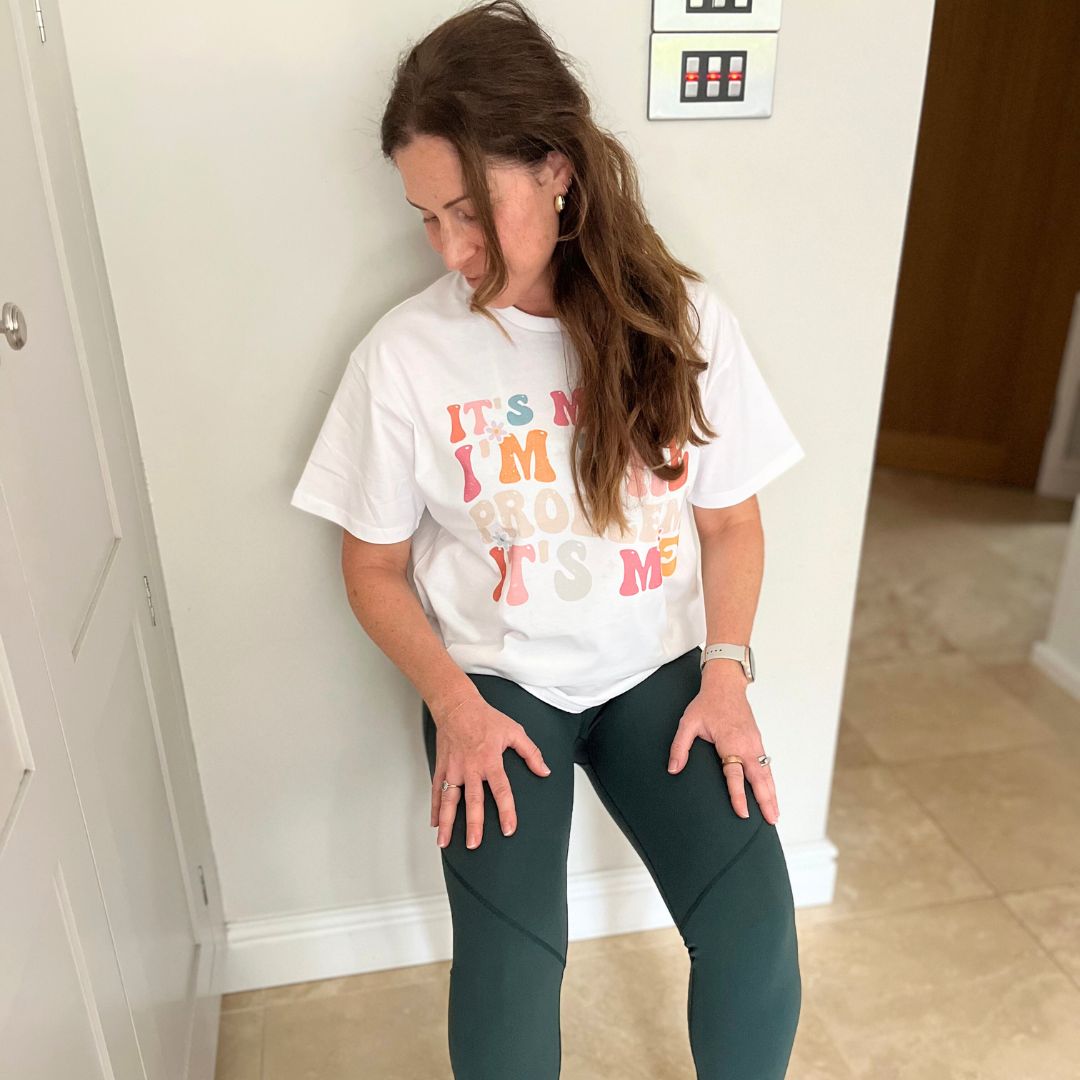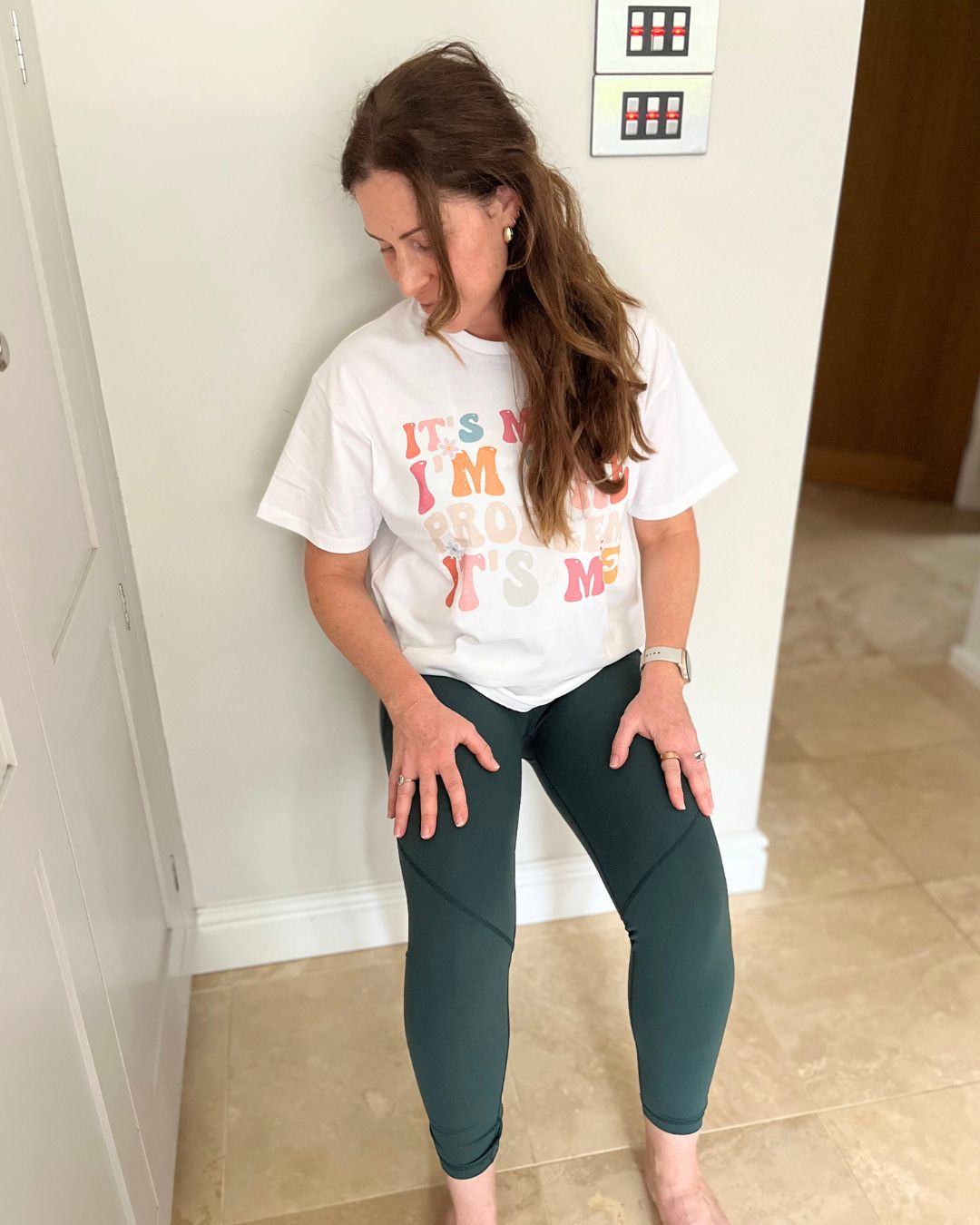
These days, fitness can be complicated. We're bombarded with viral workout challenges (75 hard, anyone?), complicated acronyms (IYKYK) and super expensive, trending kit. It's enough to put us off our exercise game entirely, but before you chuck out your sports bra and sell your fitness tracker, hear this: wall squats could be the solution.
Full disclosure: when I was asked to spend a week doing wall squats every day, I felt gleefully confident that this would be one challenge I could do in my sleep. After all, as a fitness writer, I'm no stranger to a squat and its myriad variations to boost lower body strength, But you should know, there's nothing quite like a fitness challenge to bring you back down to earth with a bump.
We've tried a fair few squat challenges here at MC UK - from bodyweight squats, to goblet squats, to Bulgarian split squats - but this one was the real kicker when it came to burn from home.
Keep scrolling to find out how to do wall squats (and why you should bother) along with how I got on. And if you're after a strength training motivation boost, read what happened when MC staffers tried strength training every day for 7 days, strength training every other day and planking every day for a week. More of an upper body kind of person? Here's how one writer got on trying push ups every day.
I tried wall squats every day for a week - here's how I got on
What are wall squats?
Let's start at the beginning and dig into what wall squats actually are. Also known as wall sits, wall squats are, quite simply, when you maintain a squat position with your back supported by a wall. Imagine sitting down in a chair - except (you've guessed it) you're relying on your leg strength to support your weight.
"Wall squats are an isometric exercise," says personal trainer and founder of The Power of Mum, Nicole Chapman. "This means that the muscles are held in a static position without involving the movement of joints like in most exercises. The muscles are activated in order to maintain the position, as opposed to an isotonic exercise, such as a traditional squat, where you're moving against resistance."
While it's tempting to think of an isometric "hold" move as easier than its more mobile counterparts, don't be fooled - you will feel the burn.
@hollyb_fitness ♬ Pretty Girl (Cheat Codes X Cade Remix) - Cheat Codes,Maggie Lindemann,CADE
What are the benefits of wall squats?
You might be familiar with the benefits of a standard squat, such as lower body strengthening, core boosting and balance supporting - and the good news is that the benefits of wall squats are just as compelling.
In fact, research (such as this review, published in the British Journal of Sports Medicine) shows that actually, wall squats could be even better than regular squats (and other types of exercise) for lowering blood pressure in particular.
More generally, wall squats pack a real punch, benefits wise. While they may not be the trendiest of moves, they come with a load of science-backed gains not to be sniffed at.
Let's dig into the benefits in turn.
1. They're accessible
"Wall squats have so many benefits," agrees Chapman. "They're low impact, meaning they're accesible for all fitness levels - they're a fabulous tool if building strength postpartum or recovering from injury."
Requiring no equipment, wall squats are perfect for beginners, and can be performed (almost) anywhere, making them the ideal exercise when you're travelling, for example.
2. They activate your core
Squats aren't just about leg strength, you'll find that, if your form is good, your abdominals will be working hard, too - helping to improve balance and stability at the same time.
3. They improve functional fitness
Keen to up your functional fitness? Then wall squats are for you. Squatting is one of the seven fundamental human movements, alongside lunge, bend, core, push, pull, and locomotion, meaning it's not only the foundation of all of our movements, but incorporating it into your training regime will reduce your risk of injury and make everyday life tasks easier.
@bobandbrad Perform Wall-Sits For Knee Pain! #physicaltherapy #bobandbrad #famouspt #kneepain #kneepainrelief #healthandwellness
♬ original sound - Bob and Brad - Bob & Brad
4. They enhance brain function
Squats are believed to be one of the best exercises for improving brain function, according to this study, published in the journal Frontiers In Neuroscience.
"Holding a squat can be tough, but you'll build mental resilience by pushing through the discomfort," says personal trainer Claudia Dumond. "So, you're working on mental toughness as well as physical strength."
5. They improve mobility
"Wall squats are very effective in improving mobility," says Chapman. "They're more knee-friendly than a standard squat but still improve mobility within the knee joint, which is important for reducing the risk of injury."
More basic mobility exercises are also a great way to up your range of motion.
I tried doing wall squats every day for a week - my honest thoughts
Days one to three
As always with my fitness challenges, I check in with a PT to make sure I've got my form on point - poor form can result in injury, plus it also likely means you won't get the best results from your moves.
Fortunately for me, wall squats really are as simple as they sound. So, when day one rolls around, I'm raring to get started - I mean, just how hard can they be?
Well, the saying pride comes before a fall couldn't be more apt, here. Confident in my lower body strength and balance, I decided to try my hand at them late one evening while brushing my teeth (surely, multi-tasking at it's finest, no?) and let's just say, the toothbrushing lasted way longer than my legs. I was not prepared to have to admit defeat before I'd even reached the 20-second mark - a time that the coaches had recommended for beginners.
Undeterred, I tried again, but, annoyingly, my feet kept slipping on the floor so I didn't feel stable at all. Turns out, being worried about slipping and injuring yourself is a real exercise buzz-kill.
So I turned to personal trainer Beth Davis for advice. Having checked my floor isn't too slippy (it's not) and I'm not wearing just socks (again, I'm not), she suggested decreasing the angle of my knees to calves (essentially, sitting a little higher up the wall) and making sure my feet are really firmly planted.

Days four to seven
By day four, I felt like I was getting the hang of things.
A few minor tweaks to my positioning later, and they've made all the difference - I'm able to hold the position until my legs shake so much I struggle to push away from the wall to release.
"I usually use the point where someone slides into breath holding or gets the leg shakes as their current threshold," laughs Davis, and I don't need to be told twice.
That said, by day five I was able to hold the squat position for around two to three sets of about 20 seconds, which is pretty good, according to the experts. From there, things only got better - by the end of the week I was managing to hold each squat (fairly) comfortably for around 40 to 50 seconds.
If you're more of a hardcore cardio fan, you might be interested to learn that the squats really did get my heart racing - not something I'd expected, but proof I was working hard, and my legs certainly felt the burn - all in all, wall squats are an unexpectedly good full-body workout. Who knew?
Will I continue doing wall squats every day?
Honestly? I was surprised at how easy wall squats were to incorporate into my routine - I'm all for moves that can be done while also doing something else (even if it was just scrolling on my phone to pass the time).
The experts also noted that I'd probably need to practice wall squats for longer than a week to notice any significant gains, something I'd agree with. Despite being able to hold the move for longer, by the end of the week I hadn't really noticed much difference to my overall leg strength.
That said, the one benefit I can attest to is mental resilience. Believe me when I say that I really wanted to stop squatting! I tried a number of distraction techniques to take my focus away from my burning quads - something I've been able to transfer to other sports too (running, I'm looking at you).
And who knows? If in a few weeks' time I notice I can maintain the position for noticeably longer, I imagine I'll feel pretty accomplished - until my next challenge, at any rate.
Shop MC UK's go-to strength training kit here
It might (still) be raining, but it's getting too hot for leggings now - these shorts version of the iconic SB Power leggings are the perfect summer swap.







